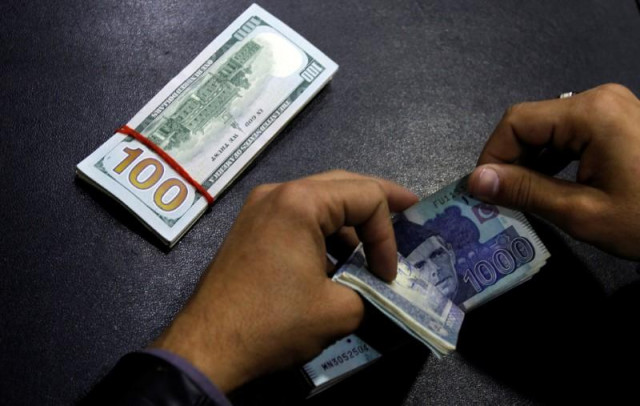Dealers traded $8b worth of foreign currency in 2017: SBP
Individuals consumed close to 63% of the total volume

A currency trader counts Pakistani Rupee notes as he prepares an exchange of USdollars in Islamabad, Pakistan. PHOTO: REUTERS
Individuals consumed close to 63% of the total volume of the currencies exchanged in the year. Besides the US dollar, demand for other major currencies - including Saudi riyal, UAE dirham, UK pound sterling and Euro - also surged during the last three years.
With the increased trade volume, which was close to $7 billion in the prior calendar year 2016, the country’s situation increased responsibilities on the end of exchange companies (ECs) to avoid playing in the hands of money launderers and terrorist financers.
In June, Pakistan was put on the grey list of the Financial Action Task Force (FATF) due to ‘strategic deficiencies’ in its anti-money laundering and terrorism financing regime.
“The role of ECs has become even more significant in recent times due to increasing importance of combating money laundering and the financing of terrorism,” SBP said in its Financial Stability Review (FSR) for the calendar year 2017.
The central bank, the apex regulator, keeps a vigilant eye on all the 52 registered exchange companies in the country and keeps on issuing comprehensive guidelines for them to address the rising challenges of money laundering and financing of terrorism, it said.
Overall, foreign currencies (FCYs) sold by ECs has remained higher than FCYs purchased by them over the last three years. “During FY17, 73.55% of total FCYs purchased by ECs have been from Individuals, while the remaining have been purchased from other ECs,” it said.
“Similarly, 62.77% of total FCYs sold have been to individuals, 25.40% have been to other ECs, while the remaining 11.83% have been sold to authorized dealers (banks) during FY17,” it added.
“FCYs sold by ECs to authorised dealers (banks) have come down to $972 million in FY17 from $1.56 billion in FY15,” the report highlighted.
Rupee appreciates against US dollar in open- and inter-bank markets
Besides, the exchange companies made outward remittances worth $500 million during the year, the central bank reported.
The demand for US dollar in foreign exchange market is more than any other foreign currency, while supply of other foreign currencies is more than their demand.
Therefore, exchange companies of category ‘A’ (ECAs) are allowed to export surplus foreign currencies, other than US dollars, to import US dollars of equivalent amount.
“Over the last three years, the amount of export of FCYs by ECs has been consistently declining, which can be attributed to increased demand for Saudi riyal due to rise in number of Hajj/Umrah pilgrims and probably decline in supply of cash FCY as emigrant workers, particularly in Saudi Arabia, are avoiding visits to Pakistan due to job concerns,” the central bank said.
The 10m overseas workers
Workers’ remittances have remained a very important source of foreign exchange flows in the country. The central bank estimated 10.1 million overseas Pakistanis (in calendar year 2017) who sent home $19.62 billion in the fiscal year ended June 30.
SBP said the exchange companies have fetched around $1.2 billion in each of the last three years (FY15, FY16 and FY17) that comes to 6.3% of the total remittances of $19.35 billion received in FY17.
Increasing inflows
Unprecedented growth witnessed in petroleum sector in five years
The central bank foresees increased inflows of foreign currencies with rise in country’s tourism and advised exchange companies to invest more for expansion of their branch network as they remained “well placed to mobilise remittances and unlike banks, their branches remain open till late evening and their services are available on Saturdays.”
With the improvement in law and order situation in the country in recent times, annual tourist arrival to Pakistan has more than tripled since CY13 to 1.75 million in CY16, while resident travelers returning to the country have increased by 30% to 38.3 million. Moreover, Pakistan has been ranked the world’s top travel destination for 2018 by the British Backpacker Society, the SBP said.
Published in The Express Tribune, August 5th, 2018.
Like Business on Facebook, follow @TribuneBiz on Twitter to stay informed and join in the conversation.


















COMMENTS
Comments are moderated and generally will be posted if they are on-topic and not abusive.
For more information, please see our Comments FAQ